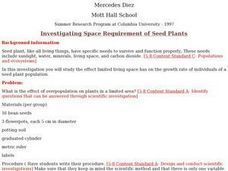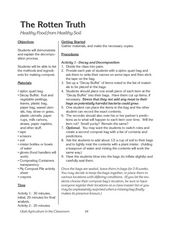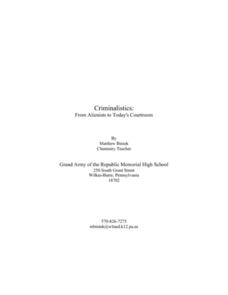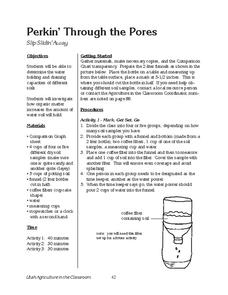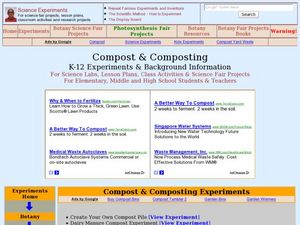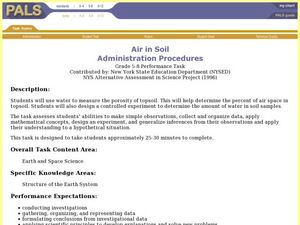Curated OER
Properties of Soil
Fourth graders conduct investigations to test different types of soil from different regions of Texas. They make comparisons and identify the characteristics of the soil. The end product of the inquiry is a student report.
Curated OER
Investigating Space Requirement of Seed Plants
Students use scientific methods to investigate the effects of overpopulation of seed plants on growth in a limited living space. Students relate seed plant population findings to that of other organisms.
Curated OER
Soil Management
Fourth graders examine different opinions on soil management. In this soil management lesson, 4th graders use a variety of resources to research how agriculture and the environment are related. They investigate cause and effect...
Curated OER
Investigative Case - Living in an Alkaline Environment
Students are shown many ways in which Mono Lake water and distilled water are different. They demonstrate that the survival of common soil bacteria declines as pH increases. Students examine the behaviors, adaptations, energy transfer,...
Curated OER
The Rotten Truth: Healthy Food from Healthy Soil
Learners investigate methods of decomposition in order to make compost. In this decomposition science lesson, students set up compost bags using food and materials which decay over time. The initial lesson is approximately 30 minutes,...
Curated OER
Investigation Xylem
Students investigate how water travels up the stem of vascular plants by using food coloring to stain the xylem of a number of different plants. They know the function of leaves, stems, and root at the end of the experiment.
Curated OER
Science: Criminalistics - A New Look at Crime
Students examine the world of forensic science, focusing on fingerprint analysis. In the lesson, they implement a method by which fingerprints of class members are categorized and identified. Elementary students study classification...
Curated OER
Plants Need Soil
Third graders identify what plants need to grow. In this agricultural lesson, 3rd graders read the book The Empty Pot and discuss the steps to take when planting a seed. Students plant a seed and water it each day. Students discuss their...
Curated OER
What Kind of Garden Would Grow in Our Schoolyard?
Students perform soil tests for pH, nitrogen, phosphorus, potassium, composition and water percolation rate and assess the conditions in the schoolyard.
Curated OER
Digging the Earth's Crust
Students investigate the Earth's crust. In this geology lesson, students identify the materials made up of the Earth's crust and investigate the different kinds of soil.
Curated OER
Perkin' Through the Pores
Young scholars investigate how organic matter increases the amount of water soil will hold. In this water soil lesson plan, students use soil and measure water amounts using organic matter. Young scholars measure the water holding...
Curated OER
Plant Needs
Students explore the needs of plants. In this plants biology lesson, students work in groups to perform an experiment with tomato plants. Each group records observations in a journal, takes pictures, and interprets the results of...
Curated OER
Take the Lead — Get the Lead Out
Students research about the physiological effects of prolonged lead exposure. In this chemistry lesson plan, students investigate the lead content of different paint, soil and water samples. They analyze data trends and share their...
Curated OER
Compost and Composting Experiments
Students investigate the composting process through a variety of experiments. In this ecology lesson, students discuss the benefits of composting. They examine how compost affect plant growth.
Curated OER
Prairie Restoration and Prairie Ecology
Students collect data as they identify and classify native prairie plants and insects. They create their own population study using a variety of sampling techniques to determine the population density of various species. Students...
Curated OER
Vermicomposting
First graders investigate composting. In this biology lesson plan, 1st graders identify ways to use garbage as fertilizer. Students examine soil and compost matter as well as the role of worms in the dirt.
Curated OER
Particulate Matter
Seventh graders examine the different types of pollutants. In this environmental science lesson, 7th graders observe particulate matter under a microscope. They explain how these can affect once health when breathed in large quantities...
Virginia Department of Education
Acid-Base Theory
Litmus paper, why so blue? A chemistry lesson includes a pre-lab activity, practice calculating pH, an experiment measuring the pH in acids and bases, a titration demonstration, and a titration experiment.
Curated OER
Erosion Mountain
Students investigate the erosive impact of water. In this erosion lesson, students research the impact of water on terraced and non-terraced hillsides. Students create an erosion model to have a hands-on experience with the soil.
Curated OER
Choose Your Own Soil Adventure
Ninth graders will use a soil survey to make management decisions and by interpreting geologic maps. The importance of different soil types is discussed and the implications of how soil can be useful for our communities.
Curated OER
Making Regolith
You may not be able to take a field trip to the moon, but that doesn't mean your class can't study moon rocks. Using graham crackers as the moon's bedrock and powdered donuts as micrometeorites, young scientists simulate the creation of...
Curated OER
Air in Soil Administration Procedures
Students study soil and its composition. In this soil composition lesson, students study examples of soil during several days of aeration. Students summarize their data, organize it, and must be able to explain their findings.
Curated OER
Science and the Scientific Process
Young scholars investigate the characteristics of different soil samples. In this physical science lesson, students play the role of forensics solving a crime by matching soil from the suspect's shoes. They formulate a conclusion after...
Curated OER
Science with Mud!
Eighth graders give some examples of chemical reactions they see everyday. In this chemistry lesson, 8th graders investigate how much water soil can hold. They collect data and compare results with others.



